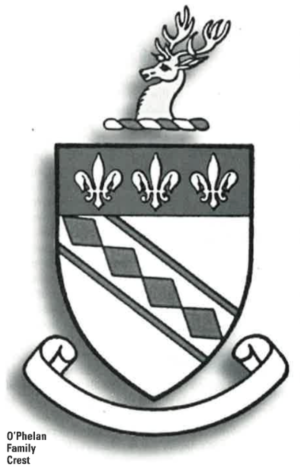The origin of the names Phelan and Whelan is an excellent example of the vagaries of Anglicization of Irish names. Both of these names are derived from the same Gaelic name O’Fáolain. Although Whelan is more common, Phelan is common in areas of Kilkenny and Waterford. The O’Faoláins were Princes of the Decies, a kingdom in the area of the current County Waterford. The Fallons or O’Fallons have been associated with Galway and Roscommon counties from earliest times. Although some scholars have suggested an association between O’Faoláin and Fallon, this is generally discounted on the basis of their very different geographical spread. The name O’Fallon is believed to be from the separate Gaelic root O’Fallamháin. Another form of this name, O’Fallonn, is found in Armagh.
The prominent Irish writer Sean O’Faoláin (1900-1991) was born in Cork as John Whelan but preferred to use the Gaelic form of his name. Among his works are The Irish, King of the Beggars and Midsummer Night Madness.
American Phelans of note include David Samuel Phelan (1841-1915) who was born in Nova Scotia but moved as a child to Saint Louis. He became a Catholic priest and spent most of his career in north Saint Louis. He was also an active journalist with his own newspaper The Western Watchman. His paper was outspoken on all issues relating to the church and was dreaded by many of his bishops who were often castigated in its pages. His editorials on non-church matters were also famously controversial since he condemned drink but defended the tango and the right of girls to use cosmetics.
James Phelan (1824-1892) was born in County Laois, Ireland but was brought to America as a small child where the family settled in New York. He became a grocery store clerk and saved his money to open his own merchant store which was successful from the beginning. By the age of 24 he had accumulated about $50,000 with which he stocked three ships with miscellaneous goods that he then sent to San Francisco with the aim of supplying the `49ers’ in the newfound gold-mines. He founded a successful business, J&M Phelan, with his brother Michael. In 1881 he built the Phelan Building, one of the first modern buildings in San Francisco. He later successfully entered banking and was vice president of the company which dredged the Panama Canal.
His son James Duval Phelan (1861-1930) became the mayor of San Francisco during the period when its corrupt politics was being reformed. He was highly successful in his reforming efforts, and in development of the city, including laying down the plan for what is now the Civic Center. As an indication of the trust in which he was held, after the 1906 earthquake and fire, President Roosevelt sent a $10 million relief fund for distribution by James Phelan rather than send it to the untrustworthy city government. He later served as California Senator from 1915 to 1921.
Another James Phelan (1856-1891) was born in Mississippi and was a writer and also a Tennessee congressman. Interesting (O’)Fallons include James O’Fallon (1744-1794) who was born in Ireland and studied medicine in Edinburgh. He emigrated to the United States in 1774 and served in the revolutionary army as a trooper and a senior surgeon. He later became a famous conspirator in the various intrigues for formation of colonies and the Southern states.
Benjamin O’Fallon (1793-1842) was born in Kentucky and was a son of the above Dr. James O’Fallon. He became an Indian agent and was eventually made responsible for all of the upper Missouri Indians. He was on excellent terms with all of the tribes and was known as “Father of the Tribes.”
John O’Fallon (1791-1865) was the other son of Dr. James O’Fallon. He joined the army as a private and apparently was not held in such high esteem by the Indians since he was wounded in an Indian war battle. He rose to become commander and then resigned and became a successful merchant in Saint Louis. He was president of the Saint Louis branch of the U.S. Bank and of the Mississippi and Ohio Railroad and was a significant benefactor to various Saint Louis institutions.
Whelans, Phelans or Fallons with ambitions to meet their clans can get advice from the Clans of Ireland Office, Kildare Street, Dublin 2.
Editor’s Note: This article was originally published in the April / May 1999 issue of Irish America. ⬥


Leave a Reply